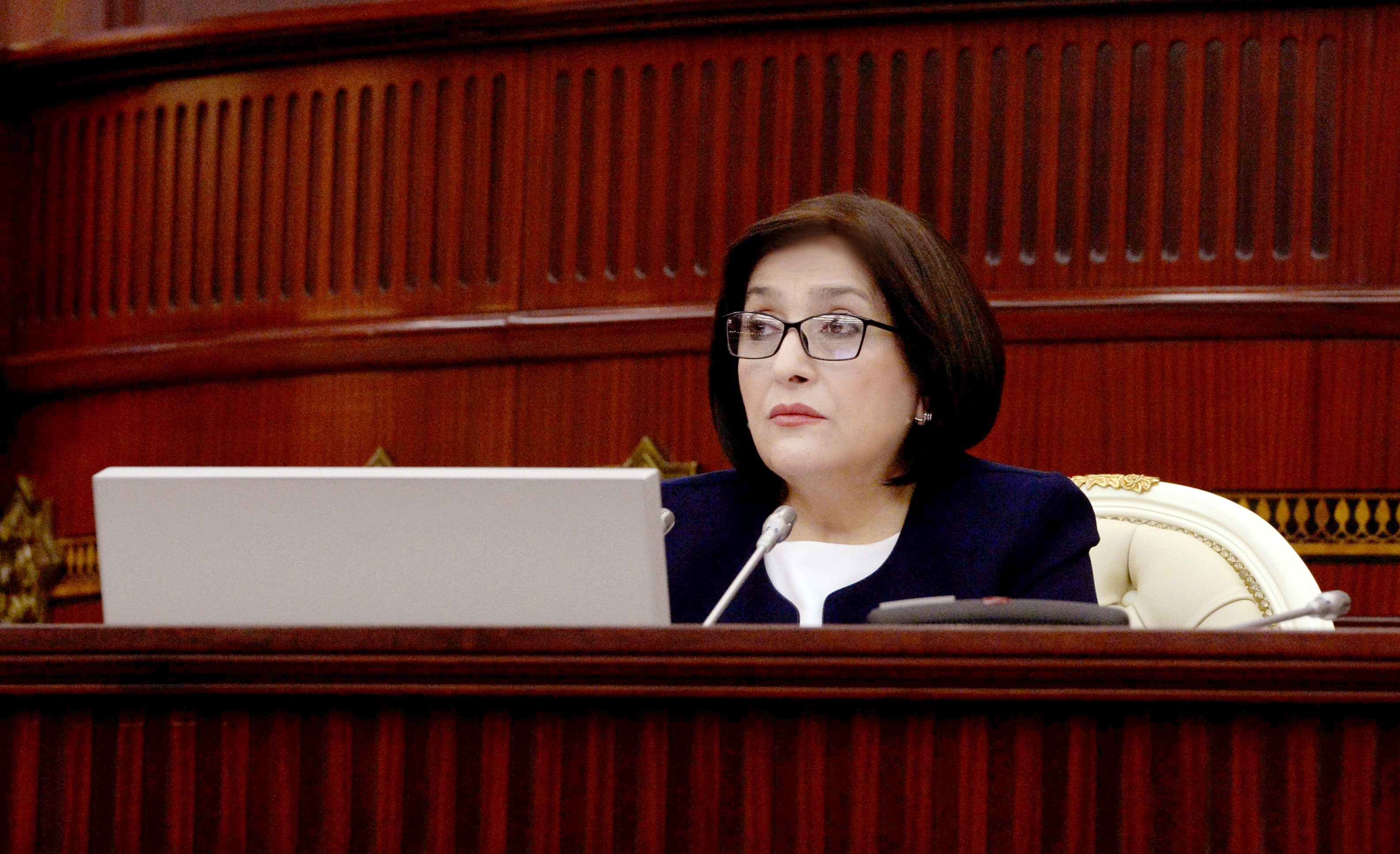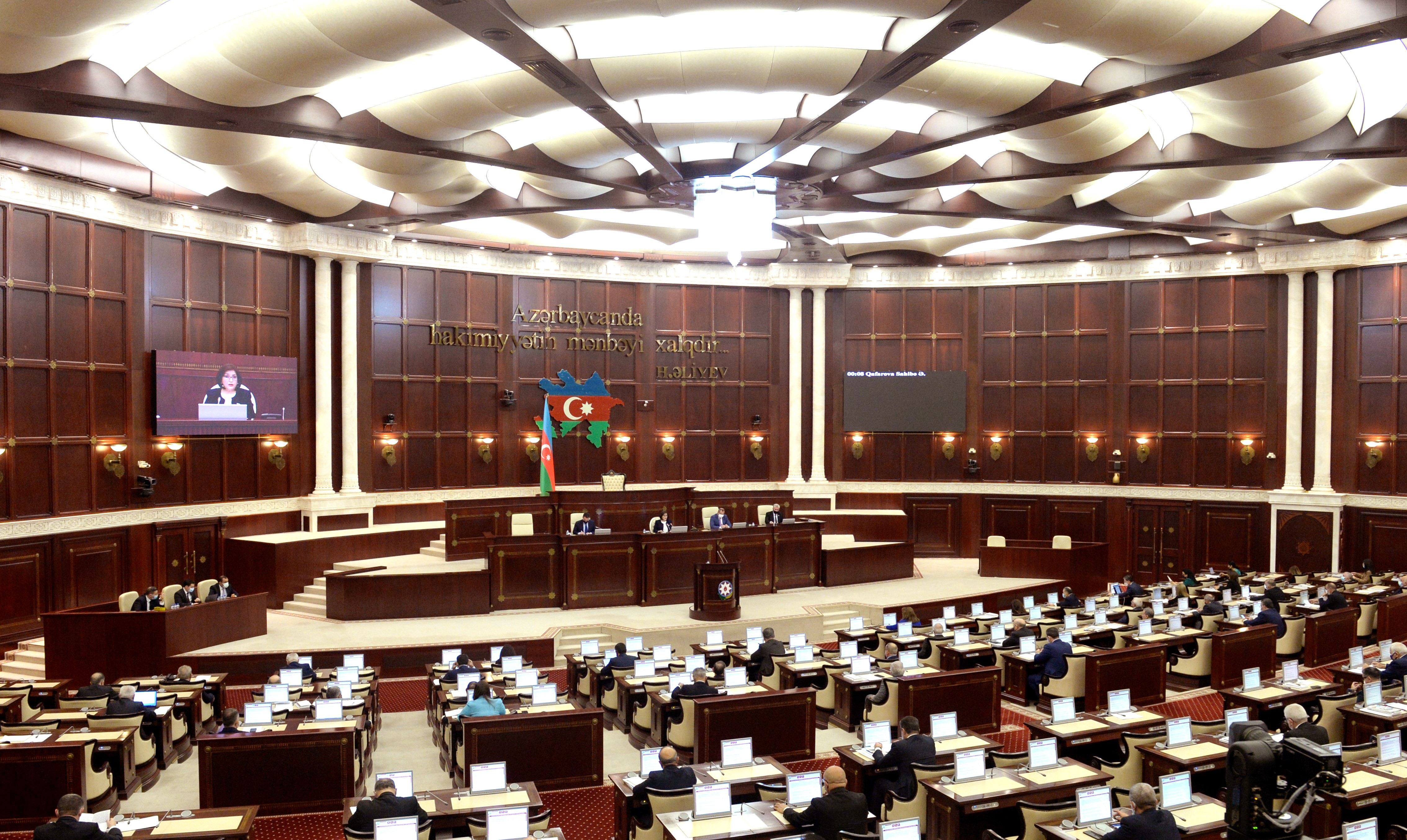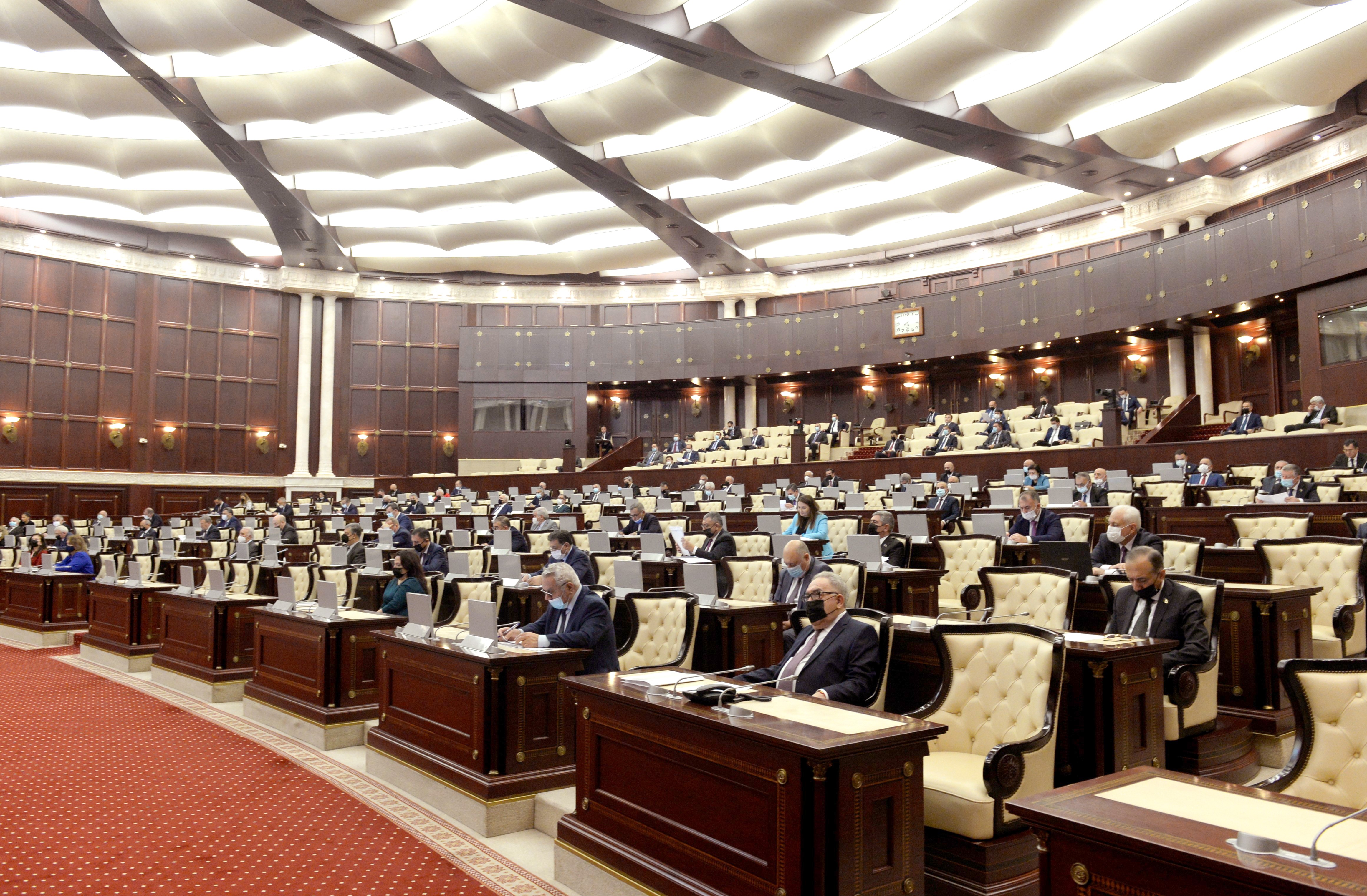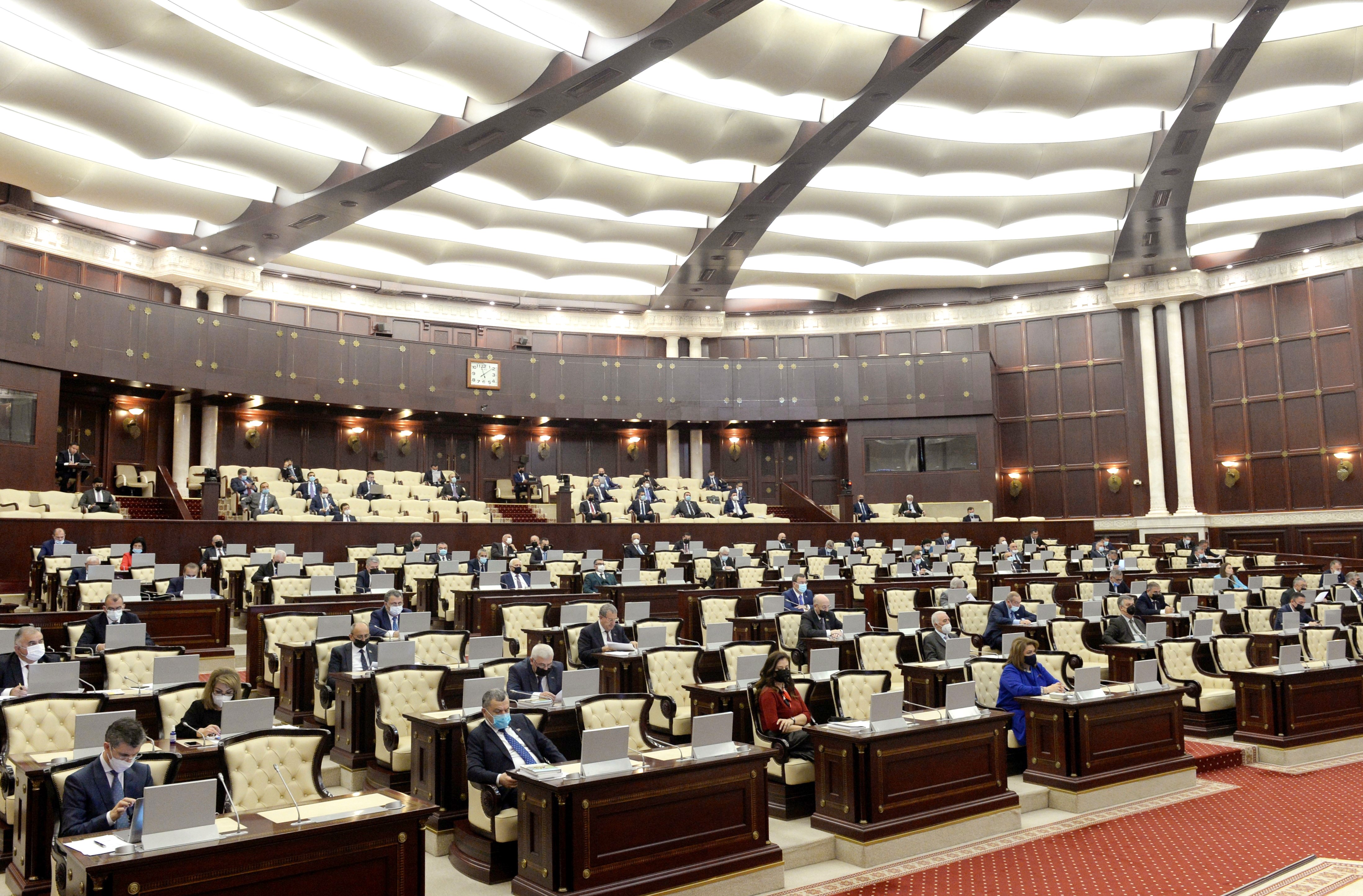At the Plenary Sitting of the Milli Majlis

Chair of the Milli Majlis Sahiba Gafarova began the scheduled parliamentary plenum held on 29 October with an account of the working visit of the Azerbaijani legislature’s delegation to Athens for the European Conference of Presidents of Parliament on 20-22 October.
‘The first European Conference of Presidents of Parliament took place in 1975 and such sessions have since then been convened once every two years traditionally – either in Strasbourg or in one of the European capitals. This past conference brought together up to 400 people including presidents of the parliaments of 47 EU member-states and observer-states. Various subjects were discussed productively at the conference that lasted for two days. I personally spoke on two subjects,’ Sahiba Gafarova was telling.
Mrs Gafarova said she had taken part in the conference opening and the subsequent session themed ‘Democracies Facing the Covid-19 Public Health Crisis: Sharing Experiences, the Way Forward’ on 21 October.
In her speech there, Sahiba Gafarova told of the measures adopted in our country to counter the calamity and voiced her concerns lest the pandemic would pose serious difficulties for many countries and backfire on development tendencies.
Our country’s backing of the world-wide struggle against the pandemic and the relevant international initiatives had been mentioned in Athens as well. Mrs Gafarova had referred to the special anti-pandemic session of the UN General Assembly convened in NYC in December last year at the suggestion Azerbaijan had made as chair of the Non-Aligned Movement. Besides, Azerbaijan was calling for equal access to the vaccines for all the countries and, to that end, motioned a relevant draft resolution on behalf of the Non-Aligned Movement. That resolution was passed unanimously in March this year, Mrs Gafarova was telling her audience in the Hellenic capital city.
‘I mentioned also Azerbaijan considering it expedient to form a UN High-Level Global Recovery Panel as a body that could contribute to the world-wide efforts to get rid of the pandemic as soon as practicable and with as little harm sustained as possible,’ Mrs Gafarova told the House.
The second time Sahiba Gafarova took the floor was at the conference session ‘The Common Future of all European Citizens’ on 22 October.
There, Mrs Gafarova opined that the challenges of the modern era show that democratic governance problems can no longer be solved within the paradigm established in the past period. Saying that, she was alluding to the necessity of formulating a uniform, non-discriminating approach to tackling the security issues that challenge the system of democratic values, especially, countering and eliminating encroachments upon national sovereignty and territorial integrity, also, ethnic separatism and rampant nationalism.
Further, in her speech in Athens Mrs Gafarova attributed the ill success of the negotiations concerning settlement of the once-existent, now-gone conflict between Armenia and Azerbaijan to the fact that no common solution could be found. One of the reasons why international endeavours made over long years to achieve a peaceful settlement to the conflict had not come to fruition consisted in Armenia’s defiance of the international law’s standards and principles whilst being non-constructive in the negotiating process. The other reason was that the aggressor state was not called ‘the aggressor state’. Indeed, in some instances the invading and the invaded states were juxtaposed; no categorical approach was manifested towards the Armenian state even for its defiance of the international order and not paying whatever attention to the demands of the international community… If no double standards had been applied to resolving the conflict, Azerbaijan would not have enforced the four resolutions of the UN Security Council demanding the liberation of the occupied Azerbaijani lands, also, the relevant documents of the other international organisations, all by itself, the President of the Azerbaijani Parliament told her colleagues in Greece.
Going forth, she reminded her international audience how, after yet another provocation, the Azerbaijan Republic exercised its right to self-defence granted by the United Nations Charter and launched a counter-offensive to stop the aggressor and to put an end to the occupation of the Azerbaijani lands.
‘And as a result of the 44-day Patriotic War, we restored international justice and the territorial integrity of Azerbaijan, and a new geopolitical reality has emerged in the South Caucasian region. Armenia must reconcile itself with and accept the new reality, and implement fully the trilateral statements of November 2020 and January 2021 that set the agreed parameters for consolidating peace and security in the region,’ Sahiba Gafarova had been telling her counterparts.
Returning to today’s plenum, Chair Gafarova told the House that the visit to Athens had also had bilateral meetings. Namely, the Chair of the Milli Majlis had conversed with President of the National Council of the Austrian Parliament Wolfgang Sobotka, President of the National Council of the Federal Assembly of the Swiss Confederation Andreas Aebi, President of the Parliament of Montenegro Aleksa Bečić and President of the Parliament of the Republic of Moldova Igor Grosu. All those meetings had proven fruitful. Also, while in the capital of Greece, Madame Chair met with President of the OSCE Parliamentary Assembly Margareta Cederfelt at the request of Ms Cederfelt herself.
Sahiba Gafarova told the Milli Majlis that she had, at every one of those meetings, emphasised that Azerbaijan had waged the 44 days’ Patriotic War in order to recover its lands from under the yoke of the Armenian occupation and restore the wholeness of its national territory – and had succeeded in achieving those goals. At the same time, our country had independently enforced the resolutions of the UN Security Council demanding immediate, unconditional and complete withdrawal of the invading forces from the territory of Azerbaijan. The conflict in the so-called ‘Nagorno Karabakh’ was over and discarded into the dustbin of history.
The Speaker of the Milli Majlis had talked at those meetings in Athens about Azerbaijan fulfilling all its obligations under the said trilateral statement whilst the continued provocations on Armenia’s part hindered a steady peace in the region. It had been a year since the statement was inked and yet, Armenia had not given over the complete minefield maps whilst the accuracy of those few that Armenia did divulge is merely 25 per cent. Furthermore, Sahiba Gafarova had stressed during the conversations in Greece that 150 Azerbaijani civilians and servicemen had to date either died or been injured having tripped the mines spudded by Armenia.
Madame Chair let her vis-à-vis know that the boundaries of Azerbaijan’s economic regions had been redrawn and the two new economic regions of Garabagh and East Zangazur been established pursuant to the decree that President Ilham Aliyev of Azerbaijan had inked in July this year. There is no territorial unit called ‘Nagorno Karabakh’ within the boundaries of Azerbaijan and it is inadmissible to refer to the very wording of ‘Nagorno Karabakh’ therefore, it was emphasised in Athens. Mrs Gafarova had added that our country was busy with the large-scale restoration work afoot in the already-free lands and that the creative efforts made currently were going to provide the region with development, peace and security.
The voyage was a success, Mrs Gafarova told the House before thanking each member of the delegation that had accompanied her to Athens.
Then, the 12-item agenda of the plenary sitting was adopted and a discussion of the issues du jour followed. The parliamentary committee chairman Zahid Oruj and the MPs Malahat Ibrahimghizi, Razi Nurullayev, Fazil Mustafa, Ali Masimli, Elman Nasirov, Elshan Musayev, Tural Ganjaliyev, Ramin Mammadov and Mushfig Jafarov opted to speak.
The MPs welcomed the congratulatory letter sent by Chair of the Milli Majlis Sahiba Gafarova to Chairman of the Great National Assembly of Turkey Mustafa Şentop on the occasion of the 98th anniversary of the establishment of the Republic of Turkey and themselves congratulated the state and people of Turkey. The speakers also voiced their conviction that the Azerbaijan-Turkish fraternity was going to continue growing yet firmer, maintaining security, peace and stability in the region. Besides, they talked about the importance of the participation of the Azerbaijani parliamentary delegation led by the Speaker of the Milli Majlis in the European Conference of Presidents of Parliament. Such visits matter much when it comes to letting the global community learn the truth about Azerbaijan, the lawmakers pointed out.
The subjects on the agenda and of concern to the constituents were broached. The MPs also underlined the libellous and biased nature of the Freedom House verdict on Azerbaijan released earlier this week and the article in The National Interest magazine written in the same spirit and attacking our country.
After that, the House turned to the items on the agenda of the plenary sitting.
First, Chairman of the Agrarian Policy Committee Tahir Rzayev presented for approval the protocol about extending the effective term of the UN FAO-Azerbaijan Partnership Programme Agreement between the Government of the Azerbaijan Republic and the UN Food and Agriculture Organisation. The term of the agreement signed on 25 May 2015 is to be prolonged until the end of the current year so as to enable the parties to fulfil their respective contractual obligations, Mr Rzayev explained.
Gudrat Hasanguliyev and Samad Seyidov offered their relevant opinions; then, the draft was put on vote and approved in one reading.
That was followed by the Bill on Establishing the Embassy of the Azerbaijan Republic to the Holy See; the overview was provided by Chairman of the International and Inter-parliamentary Relations Committee Samad Seyidov. Mr Seyidov drew the assembly’s attention to the relations between our country and the Vatican.
Deputy Chair of the Milli Majlis/Chairman of the Public Associations and Religious Entities Committee Fazail Ibrahimli said as he was commenting on the Bill that the transition to the embassial level of the diplomatic relations with the Apostolic See, which commands a strong influence over global politics through the religious prism, would certainly be to the advantage of the state and the people of Azerbaijan.
That Bill, too, was adopted in one reading only.
It was First Deputy Chair of the Milli Majlis/Chairman of the Law Policy and State-Building Committee Ali Huseynli who introduced the draft amendments to the Labour Code of the Azerbaijan Republic, saying as he did that they were adding to the Code the stipulations about the 28th of May as the Independence Day and the 18th of October as the Newfound Independence Day, in both cases pursuant to the Independence Day Law of 15 October 2021.
The MPs Fazil Mustafa, Ali Masimli, Hikmat Mammadov and Sabir Rustamkhanli shared their views of the Bill before it was voted in.
Chairman of the Economic Policy, Industries and Enterprising Committee Tahir Mirkishili tabled the third reading of the amendments to the Tax Code and said that it was proposed to lift the provision of collateral against placement of goods set for processing in the country in the special customs procedure from compulsory. The text of the Bill had remained unchanged for want of whatever suggestions at the first and second readings, Mr Mirkishili remarked.
Deputy Chair of the Milli Majlis/Chairman of the Public Associations and Religious Entities Committee Fazail Ibrahimli and Tahir Karimli shared their relevant considerations. Then, the Bill was put on vote and approved.
The fifth item on the plenum’s agenda was about the draft amendments (in the third reading) ‘On Currency Regulation’, ‘On Credit Unions’, ‘On Banks’, ‘On the Post’, ‘On Accountancy’, ‘On the Insurance Practice’, ‘On Non-Bank Credit Organisations’, ‘On Investment Funds’, ‘On the Securities Market’ and ‘On Credit Bureaux’. The exposé was supplied by Mahir Abbaszade of the Economic Policy, Industries and Enterprising Committee who specified that the purpose there was to achieve harmony with the Accountancy Law and that no remarks or suggestions had been made in the course of the previous readings. The Bill was put on vote and approved.
Another Bill in the third reading was one that contained amendments to the Law ‘On Protection of the Population Health’. It was tabled by Chairman of the Committee of Health Ahliman Amiraslanov. It follows from the Bill that the tariffs on the paid medical services excluded from the compulsory medical insurance services package but provided to the public by state medical institutions as well as the tariffs on medical services to uninsured persons are to be set by an agency that the appropriate executive authority will designate. Having said that, Mr Amiraslanov clarified certain health care-related issues that the MPs had brought up at the second reading of the Bill.
Musa Guliyev, Gudrat Hasanguliyev and Ganira Pashayeva put forth their respective ideas and asked a number of questions; Ahliman Amiraslanov answered them and then, the Bill was put on vote and approved.
Ahliman Amiraslanov also presented the next agenda item, namely, the third-reading amendments to the Civil Code of the Azerbaijan Republic and to the laws ‘On Insolvency and Bankruptcy’, ‘On Execution’, ‘On Banks’, ‘On Theatre and Theatrical Activities’, ‘On the Insurance Practice’, ‘On the Special Economic Treatment of the Export-Oriented Petroleum Operations’ and ‘On Employment’. The Committee had not received any suggestion following the second reading, Mr Amiraslanov said; he proposed that the draft amendments should be put on vote therefore. That was done duly; the Bill was adopted.
Those were all the Bills lined up for the third reading; the following four items would be the second-reading Bills, said the Speaker of the Parliament.
The overview of the draft amendments (in the second reading) to the State Duty Law was Item 8; it was tabled by Chairman of the Economic Policy, Industries and Enterprising Committee Tahir Mirkishili. It follows from the amendments that the state duties for documentation concerning the land owned by the families who bought their plots in the course of the land reform in the country would be paid from the State Budget. As Mr Mirkishili said, though the issues that the MPs had raised during the first reading were unrelated to the subject-matter of the Bill, they still had been explored and the relevant information had been supplied duly.
Chairman of the Counting Commission of the Milli Majlis Eldar Guliyev expressed his thoughts about this item and commented on the agrarian policy; then, the Bill was approved in the second reading.
Kamal Jafarov of the Law Policy and State-Building Committee tabled the draft amendments to the Code of Administrative Offences and the amendments were voted through the second reading then.
The second-reading amendments to the Education Law and the Vocational Education Law were tabled and considered together what with their being interrelated substantively. The overview was provided by Chairman of the Sciences and Education Committee Bakhtiyar Aliyev who also presented a thorough memorandum in response to the questions the MPs had asked at the extensive discussion of the first reading of both documents. The editorial amendments proposed as the Committee was processing the two amendment packages in the second reading because the two text sets were identical meant nothing as far as the Bills essences were concerned, according to Mr Aliyev.
The House listened to the remarks by the MPs Vugar Bayramov and Siyavush Novruzov before voting both Bills through the second reading.
The last item on the agenda presented by First Deputy Chair of the Milli Majlis/Chairman of the Law Policy and State-Building Committee Ali Huseynli was the draft set of amendments (in the first reading) to the to the Law ‘On the Institution of the Orders and Medals of the Azerbaijan Republic’ in connexion with the introduction of the jubilee medal ‘The 30th (1992-2022) Anniversary of the Customs Committee of the Azerbaijan Republic.’ The MPs heard Mr Huseynli’s account and then put on the Bill and approved it in the first reading, with which the scheduled plenary sitting of the Milli Majlis was over.
The Press and Public Relations Department
The Milli Majlis







